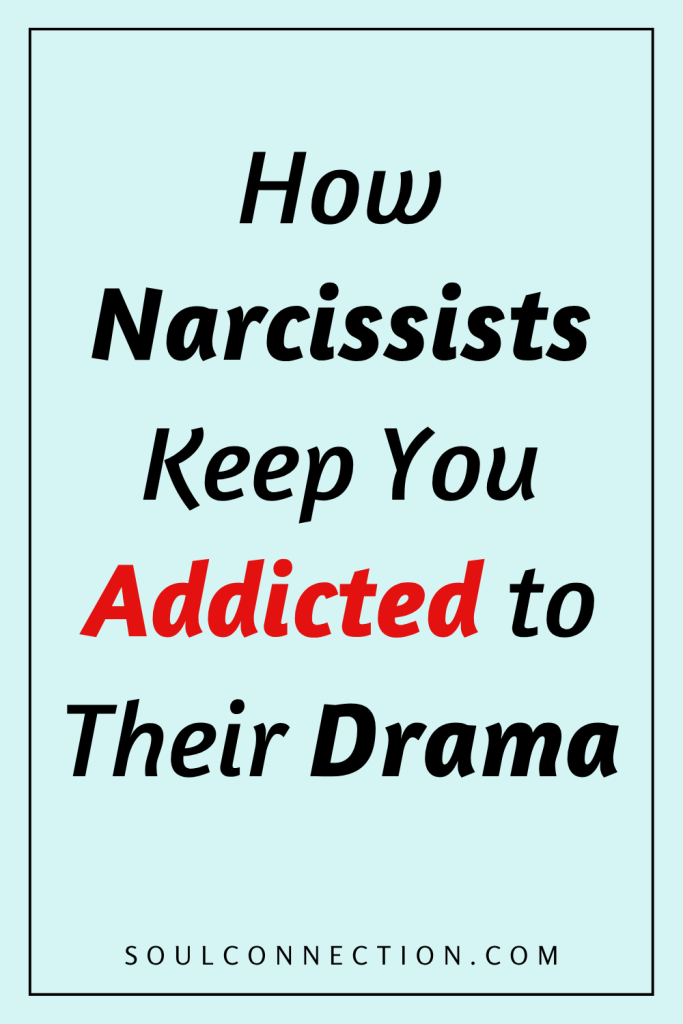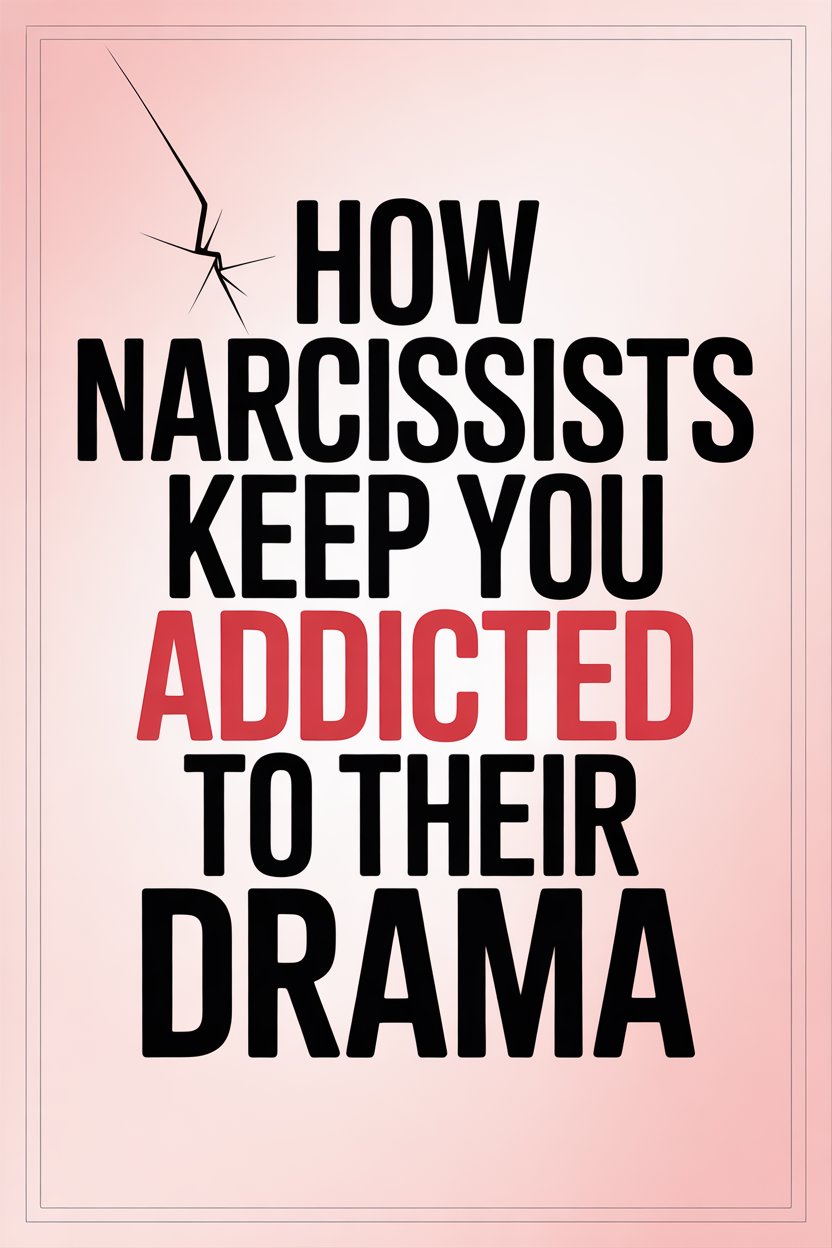Ever feel like your life has turned into the emotional equivalent of a reality TV show you never signed up for?
If you’ve been entangled with a narcissist, chances are you know the thrill (and the exhaustion) of constant, high-stakes drama—except there’s no million-dollar prize, just a pile of confusion and a steadily draining sense of self.
Welcome to the chaos factory.
Narcissists are experts at keeping you hooked. Not with charm alone, but with a psychological rollercoaster that leaves you half dizzy, half desperate, and oddly unable to step off the ride.
Here’s how they keep the drama alive—and keep you right in the thick of it.
The Hook: Love Bombing and Idealization
It always starts with fireworks. Grand gestures, lavish compliments, declarations of undying affection (probably before you’ve even finished your salad on the first date).
The narcissist sweeps you up with more intensity than a caffeinated tornado.
This is no accident. It’s the “hook,” and it’s as deliberate as it is intoxicating. The love bombing phase floods your brain with feel-good chemicals—dopamine, oxytocin, and a truckload of hope.
Suddenly, you’re convinced you’ve found The One. Spoiler: they’re not. But by the time you realize it, you’re already craving the high they so expertly administered.
The Push-Pull: Hot and Cold as a Tap
After the initial lovefest, something changes. Maybe they stop texting back as much. Or they start picking at little things that never seemed to bother them before.
One day they’re obsessed with you, the next, you’re getting the cold shoulder or, worse, passive-aggressive one-word replies.
This isn’t moodiness—it’s bait. By alternating affection with withdrawal, they keep you chasing that initial rush of validation. It’s basic Pavlov, minus the dog treats and with twice the anxiety.
You start working harder for their attention, desperate to get back the adoration you were showered with at the start. Ironically, the more you chase, the less they give. And on the cycle spins.
Gaslighting and Emotional Confusion
Ever found yourself doubting your own memory? Maybe you’re apologizing for things you’re not even sure happened. Welcome to the world of gaslighting—a narcissist’s favorite parlor trick.
Gaslighting sows confusion, and confusion breeds dependence. When you can’t trust your own judgment, you start looking to the narcissist for cues on what’s real.
A neat little feedback loop that keeps you tethered to their interpretation of reality—which, conveniently, always puts them in the right.
Triangulation: Stoking the Fire
If you think the drama is just between you and the narcissist, think again. They love to stir in a third (or fourth) party for extra spice.
Maybe it’s an ex who just “won’t leave them alone,” or a mysterious friend whose opinion suddenly matters more than yours.
Triangulation isn’t just about jealousy; it’s about control. Now you’re competing for their attention, questioning your worth, and oh—did someone say drama? Consider it dialed to eleven.
Intermittent Reinforcement: The Psychological Slot Machine
Ever feel like you’re pulling the lever on a one-armed bandit, waiting for that one big “win” of affection? That’s intermittent reinforcement at play.
Occasional gifts, random compliments, or rare nights where everything is perfect—they’re just frequent enough to keep hope alive.
Psychological studies show that unpredictable rewards are more addictive than regular ones. Narcissists know this instinctively, doling out just enough positivity to keep you stuck to the machine, always pulling for the next jackpot.
Creating Emergencies and Crises
Narcissists have a sixth sense for drama—and not just the garden-variety kind. Think last-minute emotional emergencies, endless feuds with relatives, or work catastrophes that demand your undivided attention.
Their crises become your crises. Before you know it, your life revolves around soothing, rescuing, or fixing them. That’s energy you could be using to, say, enjoy a hobby or take a nap.
Instead, you’re on perpetual standby, forever at the mercy of their next meltdown.
Eroding Boundaries with Guilt and Obligation
Boundaries? Narcissists treat those like speed bumps: slow down just enough to ignore them completely.
The trick is subtle—guilt-tripping you for having needs or shaming you for wanting alone time. “I guess you don’t care about me if you need space,” they’ll sigh (loudly).
Pretty soon, saying “no” feels like signing the death warrant for the relationship. Over time, your comfort zone becomes a distant memory, and their wishes move in, redecorate, and start eating all your snacks.
Keeping You Isolated
The more you’re glued to their drama, the less time you have for anyone else. Friends, family, and hobbies start to fade into the background, sometimes because the narcissist openly criticizes them, other times by monopolizing your schedule.
Isolation isn’t always a locked-door scenario. It’s more like a slow fade, where your support systems quietly wither away. By the time you realize it, your world shrunk to fit just one person—and, surprise, it’s the narcissist in the starring role.
Playing the Victim: Sympathy as a Weapon
When all else fails, cue the world’s tiniest violin. No one suffers quite as artfully as a narcissist. Every slight, every setback, every imagined offense becomes evidence of their martyrdom.
Sympathy is a powerful glue. The more you’re roped into fixing their feelings or defending them against imaginary foes, the more invested you become in their emotional rollercoaster.
You stop seeing patterns, start making excuses, and just like that, you’re an unpaid crisis counselor.
FOMO: The Drama Withdrawal
Eventually, you may tire of the emotional turbulence. Maybe you even threaten to leave. That’s when a strange thing happens—fear of missing out kicks in.
What if you walk away and suddenly they become the person they promised to be? What if someone else gets the love-bomb treatment?
Narcissists know this. They hint at change, dangle hope, and sometimes even revert to their charming selves—just long enough to reel you back.
Next thing you know, you’re hooked on the idea that, any day now, things will be different.
How to Break the Spell Tonight
Breaking the addiction to narcissistic drama isn’t about willpower alone. It’s about clarity, boundaries, and sometimes a little professional help. Here’s what actually works when you’re ready to swap drama for peace:
Spot the Patterns
Keep a journal. No, not to start your memoir (though you could probably sell the movie rights). Tracking incidents helps you see the cycle for what it is—predictable, manipulative, and not your fault.
Rebuild Your Support System
Reach out to friends or family you trust. Even if it’s been a while, genuine folks have a knack for showing up when you need them. If your best mate responds with “Took you long enough,” consider that a warm welcome back.
Set Boundaries and Stick to Them
Boundaries aren’t rude—they’re necessary. Try short, clear statements. “I can’t talk right now,” works wonders. Don’t justify or over-explain. You’re not on trial.
Take Space—Emotionally and Physically
If possible, create distance, even if it’s temporary. Spend a few hours (or nights) away. The clarity you gain outside the drama bubble is priceless.
Seek Professional Support
Therapists aren’t just for movie characters or celebrities. A good counselor can help you untangle guilt, rebuild confidence, and develop strategies that stick.
Remind Yourself Why You Deserve Peace
Make an actual list. Yes, pen and paper. All the things you want in a relationship that aren’t on offer here. Compare as needed. Spoiler: “constant anxiety” shouldn’t make the cut.
Cut Contact If You Must
Sometimes, the only way out is a clean break. Block, mute, unfollow, change your phone number if you have to. Drama only thrives where it’s fed.
Reclaiming the Remote Control
No one signs up for the narcissist’s reality show on purpose, but escaping the drama is entirely possible.
It isn’t easy—drama is addictive, after all—but your energy, self-respect, and future happiness are more than worth the effort.
The most important plot twist? You get to write your next chapter.
And trust me, life outside the circus tent feels a whole lot calmer—if a bit quieter—once you finally walk out.


